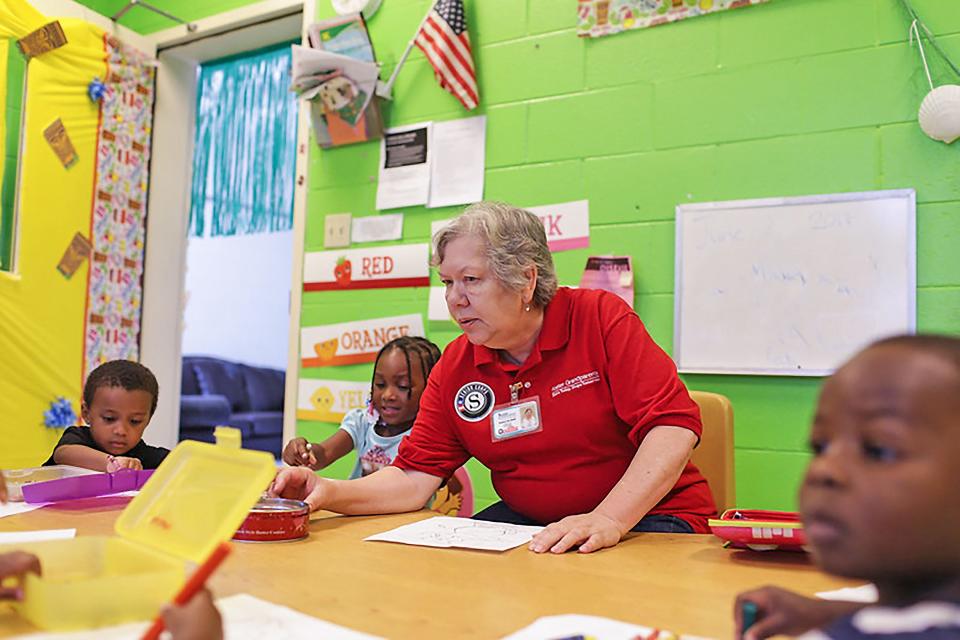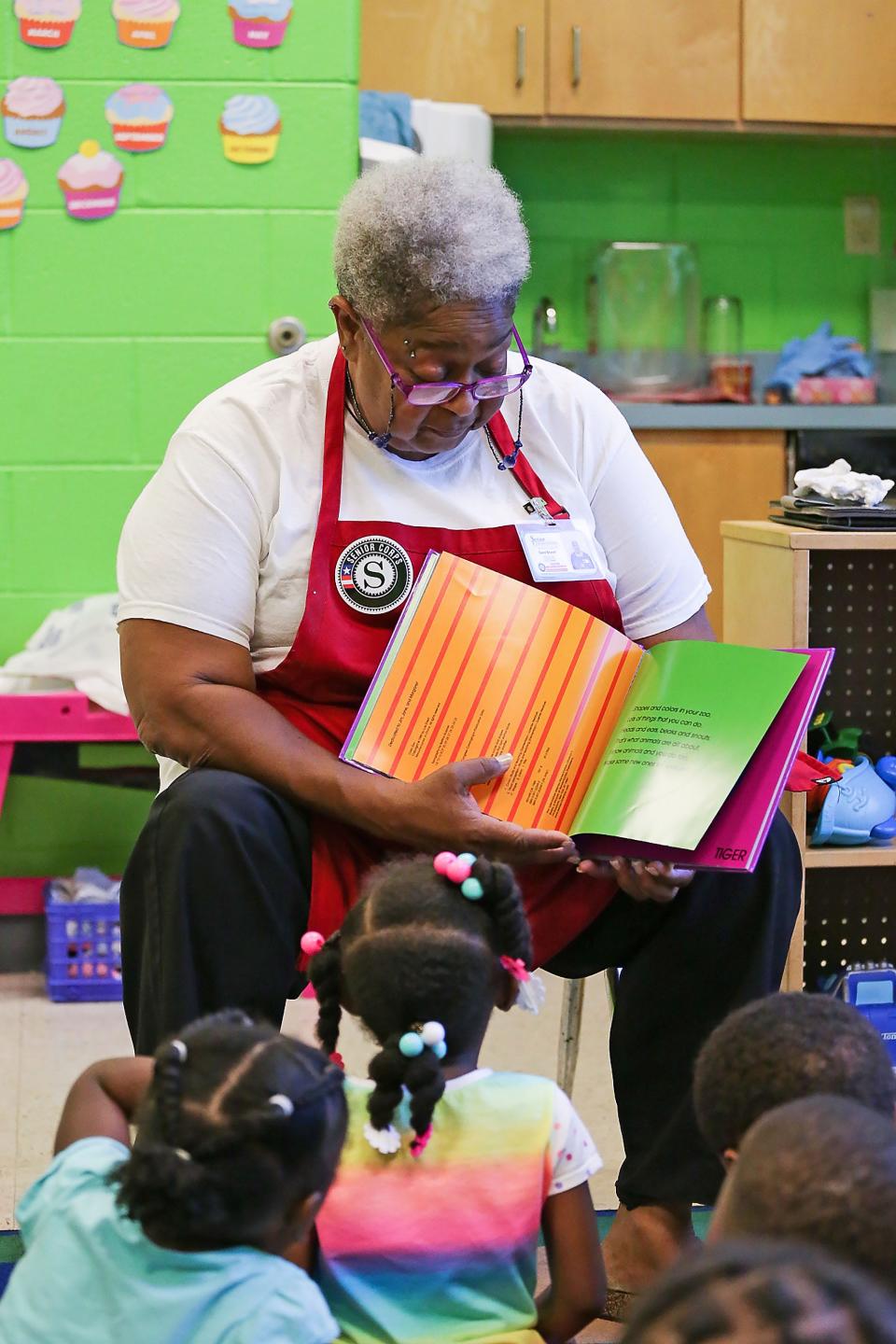'Foster Grandparents' volunteer in Columbia schools. Here's how they help kids learn
Columbia resident Phillis Jones roughly 21 years ago learned of a program that would have an impact on elementary school-aged youths. About a year later, her sister Pat Prentice joined. The program was AmeriCorps Seniors Foster Grandparents, which is coordinated locally by Central Missouri Community Action.
Jones spends her days from about 8 a.m. to 1 p.m. at Benton Elementary School, while Prentice, since she helps in a physical education setting, works from 7-11 a.m. at Two Mile Prairie Elementary School. They, along with Maymie Carter and Laurette Hatton, who both spend their days at Blue Ridge Elementary School, make up the roughly 45 Foster Grandparents across CMCA's coverage area.
The number of grandparents continues to be down after the COVID-19 pandemic and has not yet returned to pre-pandemic number of 70 Foster Grandparents, wrote Janet Evans, program coordinator, in a message to the Tribune. The goal always is at least 80.
While Boone County serves as the home office for CMCA, it also operates in Audrain, Callaway, Cole, Cooper, Howard, Moniteau, Montgomery, Osage and Randolph counties.
"All 10 counties need volunteers. There are so many children who fall behind, and while the teachers do such an amazing job, the statistics in Missouri show the children have fallen farther behind now, than prior to COVID," Evans wrote. "Audrain County desperately needs more foster grandparent volunteers for their Head Start program. Howard, Moniteau and Montgomery counties currently have no volunteers."

Foster Grandparents are those 55 and older, who have retired, have the ability to serve assigned children, be physically able to serve, ability to volunteer at least 15 hours per week and willing to accept supervision as needed. Following background checks and other training, Foster Grandparents also could be eligible to receive a $4 per hour stipend, are provided at least one hot meal and could receive mileage or transportation reimbursement as well.
"I guarantee that the stipend is not what brings and keeps people volunteering for the Foster Grandparent program. The emotional reward seems to be the biggest draw, the purpose," Evans wrote.
Those interested in becoming a Foster Grandparent, can call CMCA at 573-777-5225 or email fostergrandparents@cmca.us. An online form also is available to sign up.
What Foster Grandparents do
Prentice, as noted, helps in a physical education class, while other volunteers interviewed by the Tribune are in traditional classrooms, even are working with students who may have special educational needs.
They provide an extra set of eyes and ears for teachers and while not allowed to discipline students, can redirect behavior through questions and other responsive parenting techniques.
Foster Grandparents provide input on where they would like to help in the schools, which is taken into consideration. The Foster Grandparent program is most effective in pre-kindergarten and elementary settings, though there may be some in middle and higher grade levels, Evans wrote.
Jones and Prentice expressed how they both had grown children and still were looking for ways to remain active seniors, which is when Jones first came across the Foster Grandparent program.
"I've been doing it 20 years. I love it," Jones said.
Prentice, who lives on her own, loves children and volunteering gets her out of the house, she said. She helps with what she described as motor labs, again at Two Mile Prairie.
"It gets the wiggles out," she said.
Jones is helping in a classroom setting, again at Benton Elementary, where students will read to her or she will read to them and she helps with other testing.
Carter and Hatton have similar classroom experiences at Blue Ridge Elementary. Friends had told Carter about the program, which piqued her interest to get involved. She has served for about 6 1/2 years.
"I like it. I get to talk with the children. Ask them questions. They are pretty ready to talk. They are children and they like talking," Carter said. "I work with all ages and those with learning disabilities. ... We learn from them as much as they learn from us."

Hatton has helped for roughly 8 1/2 years as a Foster Grandparent. A desire to help children drew her to the program, she said.
"When I started working for the Foster Grandparent program, I was hands-on," Hatton said. "I worked in the day care centers and the Moving Ahead program and the elementary schools."
A big part of what Hatton does, she said, is redirecting behaviors, listening to her assigned students, asking them questions to hopefully set them on a different life path in the future, she said. It is these conversations that can help school staff address issues or concerns not only with students, but also at the student's home, Hatton added.
Program history, benefits
Foster Grandparents are not a recent phenomenon. They in fact, have a nearly 60-year history, Evans noted.
"The Foster Grandparent program was started nationally in 1965. It was established as part of President Lyndon Johnson’s 'War On Poverty' and developed by Sargent Shriver as part of the newly formed Office of Economic Opportunity," she wrote.
CMCA has locally coordinated the program since 1967. The Office of Economic Opportunity now is known as the Office of Community Services under the Administration for Children and Families and U.S. Department of Health and Human Services.
"The statistics recorded by AmeriCorps have clearly proven the benefit to the students, as far as the academic and social/emotional benefits of having a school grandma or grandpa mentor/tutor in the classroom," Evans wrote "Studies have also proven the emotional well-being to the Foster Grandparent."
The studies cannot convey deeply emotional responses from volunteers, though, Evans added.
This has included, “The children are my purpose," "My kids are the reason I get up every morning" or "one of my kids ran over to me in the grocery store and gave me a hug. It made me so happy."
When a person signs up to be a Foster Grandparent there is a training on what sort of student behaviors to expect and how those behaviors can be redirected. Any needed discipline still is done by the teacher.
There is a wide variety of what could be a typical day for a Foster Grandparent.
"Some Foster Grandparents work with babies and toddlers in a day care setting. ... Toddlers are a lot more active, as one might expect," Evans wrote. "Foster Grandparents might assist by reading stories to the children, helping with craft activities, or modeling manners at lunch time."
Older children may need help with reading, vocabulary or math skill reinforcement and all at a teacher's direction.
"Foster Grandparents are there to assist the teachers, not take their place (and) the Foster Grandparent volunteer is never left alone with any child or children," Evans wrote.
Charles Dunlap covers local government, community stories and other general subjects for the Tribune. You can reach him at cdunlap@columbiatribune.com or @CD_CDT on Twitter. Subscribe to support vital local journalism.
This article originally appeared on Columbia Daily Tribune: Love working with kids? Foster Grandparents volunteer in local schools

